have 的用法
- 格式:doc
- 大小:87.50 KB
- 文档页数:11
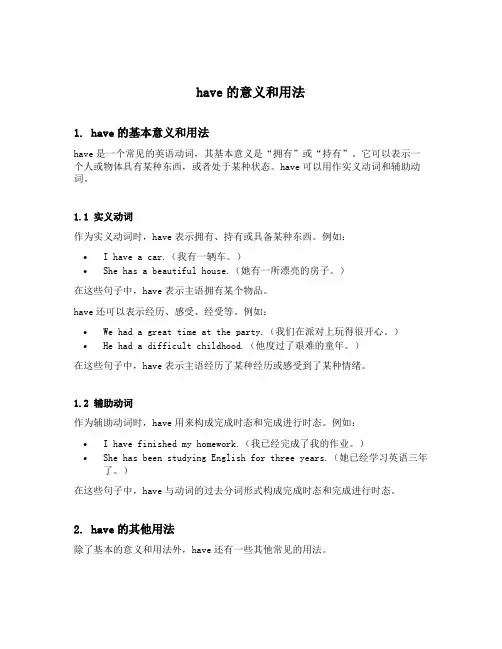
have的意义和用法1. have的基本意义和用法have是一个常见的英语动词,其基本意义是“拥有”或“持有”。
它可以表示一个人或物体具有某种东西,或者处于某种状态。
have可以用作实义动词和辅助动词。
1.1 实义动词作为实义动词时,have表示拥有、持有或具备某种东西。
例如:•I have a car.(我有一辆车。
)•She has a beautiful house.(她有一所漂亮的房子。
)在这些句子中,have表示主语拥有某个物品。
have还可以表示经历、感受、经受等。
例如:•We had a great time at the party.(我们在派对上玩得很开心。
)•He had a difficult childhood.(他度过了艰难的童年。
)在这些句子中,have表示主语经历了某种经历或感受到了某种情绪。
1.2 辅助动词作为辅助动词时,have用来构成完成时态和完成进行时态。
例如:•I have finished my homework.(我已经完成了我的作业。
)•She has been studying English for three years.(她已经学习英语三年了。
)在这些句子中,have与动词的过去分词形式构成完成时态和完成进行时态。
2. have的其他用法除了基本的意义和用法外,have还有一些其他常见的用法。
2.1 have tohave to表示“必须”或“需要”。
它用于表达义务、责任或强制性要求。
例如:•I have to go to work early tomorrow.(我明天必须早点去上班。
)•She has to study for the exam.(她需要为考试而学习。
)在这些句子中,have to表示主语被迫或有责任做某事。
2.2 have gothave got是have的口语形式,表示“拥有”。
它在口语中更常见,并且可以用于所有时态。
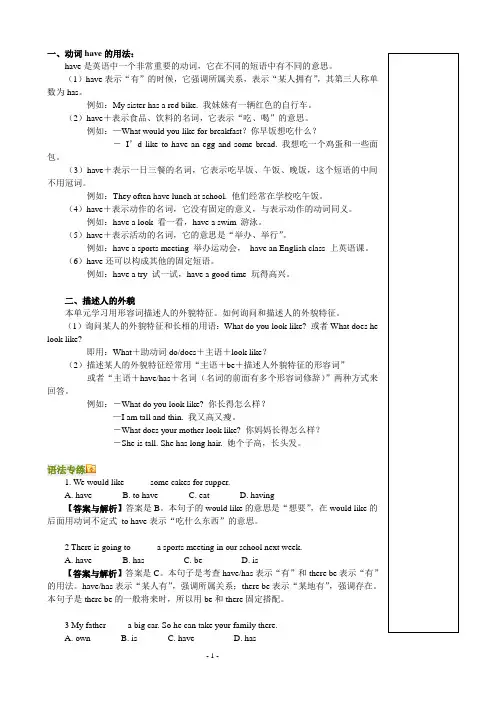
一、动词have的用法:have是英语中一个非常重要的动词,它在不同的短语中有不同的意思。
(1)have表示“有”的时候,它强调所属关系,表示“某人拥有”,其第三人称单数为has。
例如:My sister has a red bike. 我妹妹有一辆红色的自行车。
(2)have+表示食品、饮料的名词,它表示“吃、喝”的意思。
例如:—What would you like for breakfast?你早饭想吃什么?-I’d like to have an egg and some bread. 我想吃一个鸡蛋和一些面包。
(3)have+表示一日三餐的名词,它表示吃早饭、午饭、晚饭,这个短语的中间不用冠词。
例如:They often have lunch at school. 他们经常在学校吃午饭。
(4)have+表示动作的名词,它没有固定的意义,与表示动作的动词同义。
例如:have a look 看一看,have a swim 游泳。
(5)have+表示活动的名词,它的意思是“举办、举行”。
例如:have a sports meeting 举办运动会,have an English class 上英语课。
(6)have还可以构成其他的固定短语。
例如:have a try 试一试,have a good time 玩得高兴。
二、描述人的外貌本单元学习用形容词描述人的外貌特征。
如何询问和描述人的外貌特征。
(1)询问某人的外貌特征和长相的用语:What do you look like? 或者What does he look like?即用:What+助动词do/does+主语+look like?(2)描述某人的外貌特征经常用“主语+be+描述人外貌特征的形容词”或者“主语+have/has+名词(名词的前面有多个形容词修辞)”两种方式来回答。
例如:-What do you look like? 你长得怎么样?—I am tall and thin. 我又高又瘦。
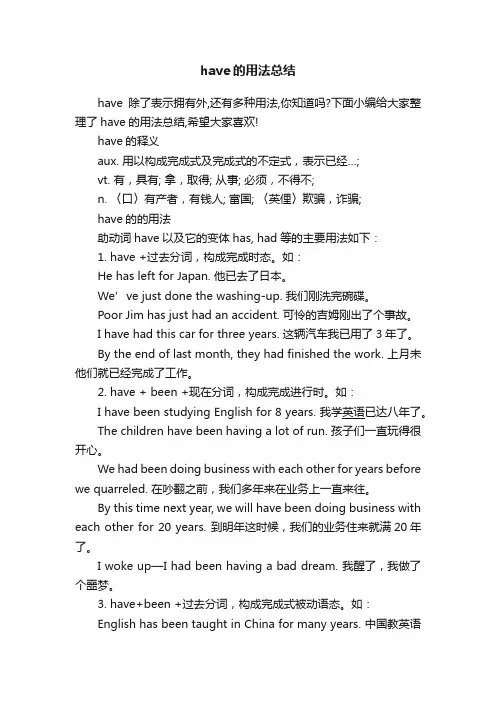
have的用法总结have除了表示拥有外,还有多种用法,你知道吗?下面小编给大家整理了have的用法总结,希望大家喜欢!have的释义aux. 用以构成完成式及完成式的不定式,表示已经…;vt. 有,具有; 拿,取得; 从事; 必须,不得不;n. 〈口〉有产者,有钱人; 富国; 〈英俚〉欺骗,诈骗;have的的用法助动词have以及它的变体has, had等的主要用法如下:1. have +过去分词,构成完成时态。
如:He has left for Japan. 他已去了日本。
We’ve just done the washing-up. 我们刚洗完碗碟。
Poor Jim has just had an accident. 可怜的吉姆刚出了个事故。
I have had this car for three years. 这辆汽车我已用了3年了。
By the end of last month, they had finished the work. 上月未他们就已经完成了工作。
2. have + been +现在分词,构成完成进行时。
如:I have been studying English for 8 years. 我学英语已达八年了。
The children have been having a lot of run. 孩子们一直玩得很开心。
We had been doing business with each other for years before we quarreled. 在吵翻之前,我们多年来在业务上一直来往。
By this time next year, we will have been doing business with each other for 20 years. 到明年这时候,我们的业务住来就满20年了。
I woke up—I had been having a bad dream. 我醒了,我做了个噩梦。
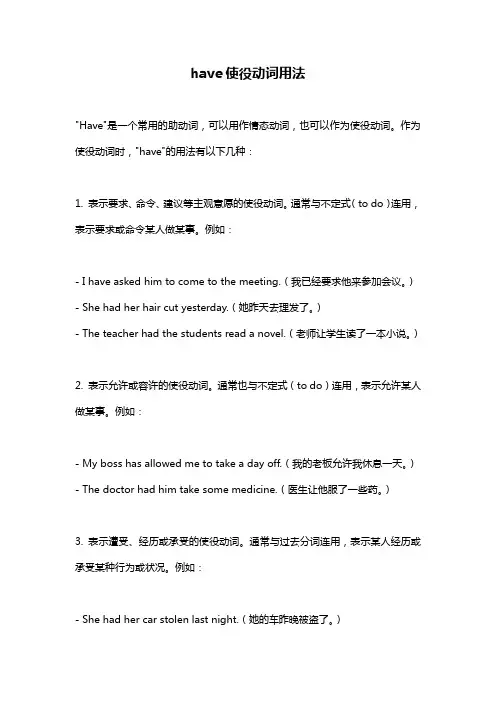
have使役动词用法
"Have"是一个常用的助动词,可以用作情态动词,也可以作为使役动词。
作为使役动词时,"have"的用法有以下几种:
1. 表示要求、命令、建议等主观意愿的使役动词。
通常与不定式(to do)连用,表示要求或命令某人做某事。
例如:
- I have asked him to come to the meeting.(我已经要求他来参加会议。
)- She had her hair cut yesterday.(她昨天去理发了。
)
- The teacher had the students read a novel.(老师让学生读了一本小说。
)
2. 表示允许或容许的使役动词。
通常也与不定式(to do)连用,表示允许某人做某事。
例如:
- My boss has allowed me to take a day off.(我的老板允许我休息一天。
)- The doctor had him take some medicine.(医生让他服了一些药。
)
3. 表示遭受、经历或承受的使役动词。
通常与过去分词连用,表示某人经历或承受某种行为或状况。
例如:
- She had her car stolen last night.(她的车昨晚被盗了。
)
- He had his leg broken in a skiing accident.(他在滑雪事故中摔断了腿。
)
总之,"have"作为使役动词可以表达很多不同的意义,需要根据具体语境进行理解。
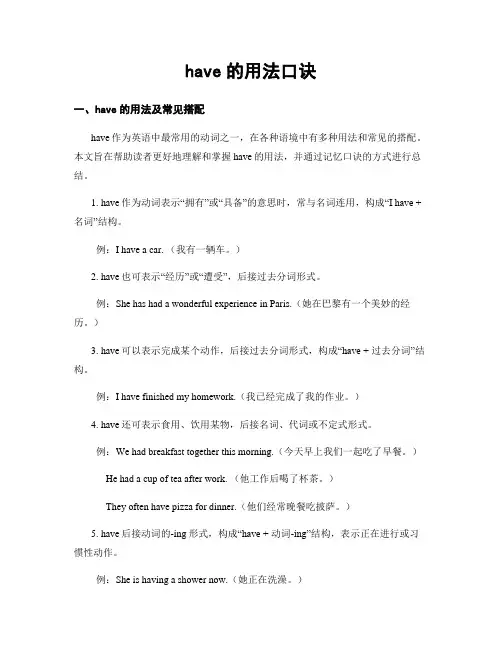
have的用法口诀一、have的用法及常见搭配have作为英语中最常用的动词之一,在各种语境中有多种用法和常见的搭配。
本文旨在帮助读者更好地理解和掌握have的用法,并通过记忆口诀的方式进行总结。
1. have作为动词表示“拥有”或“具备”的意思时,常与名词连用,构成“I have + 名词”结构。
例:I have a car. (我有一辆车。
)2. have也可表示“经历”或“遭受”,后接过去分词形式。
例:She has had a wonderful experience in Paris.(她在巴黎有一个美妙的经历。
)3. have可以表示完成某个动作,后接过去分词形式,构成“have + 过去分词”结构。
例:I have finished my homework.(我已经完成了我的作业。
)4. have还可表示食用、饮用某物,后接名词、代词或不定式形式。
例:We had breakfast together this morning.(今天早上我们一起吃了早餐。
)He had a cup of tea after work. (他工作后喝了杯茶。
)They often have pizza for dinner.(他们经常晚餐吃披萨。
)5. have后接动词的-ing形式,构成“have + 动词-ing”结构,表示正在进行或习惯性动作。
例:She is having a shower now.(她正在洗澡。
)They often have a party on weekends.(他们经常在周末开派对。
)二、口诀总结have的用法为了帮助大家更好地记忆和掌握have的用法,下面给出一个口诀供参考:I have something, that's true,我有东西, 是真实,But sometimes it means I do.但是有时候它意味着我做。
Have can also show possession,"拥有"含有所有权。
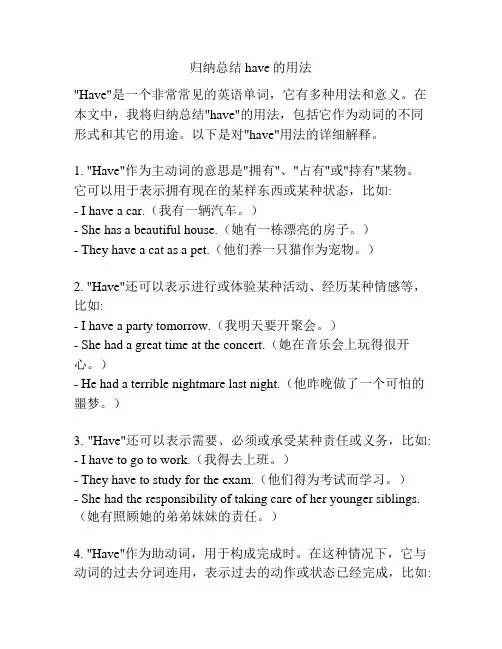
归纳总结have的用法"Have"是一个非常常见的英语单词,它有多种用法和意义。
在本文中,我将归纳总结"have"的用法,包括它作为动词的不同形式和其它的用途。
以下是对"have"用法的详细解释。
1. "Have"作为主动词的意思是"拥有"、"占有"或"持有"某物。
它可以用于表示拥有现在的某样东西或某种状态,比如:- I have a car.(我有一辆汽车。
)- She has a beautiful house.(她有一栋漂亮的房子。
)- They have a cat as a pet.(他们养一只猫作为宠物。
)2. "Have"还可以表示进行或体验某种活动、经历某种情感等,比如:- I have a party tomorrow.(我明天要开聚会。
)- She had a great time at the concert.(她在音乐会上玩得很开心。
)- He had a terrible nightmare last night.(他昨晚做了一个可怕的噩梦。
)3. "Have"还可以表示需要、必须或承受某种责任或义务,比如: - I have to go to work.(我得去上班。
)- They have to study for the exam.(他们得为考试而学习。
)- She had the responsibility of taking care of her younger siblings.(她有照顾她的弟弟妹妹的责任。
)4. "Have"作为助动词,用于构成完成时。
在这种情况下,它与动词的过去分词连用,表示过去的动作或状态已经完成,比如:- I have seen that movie before.(我以前看过那部电影。
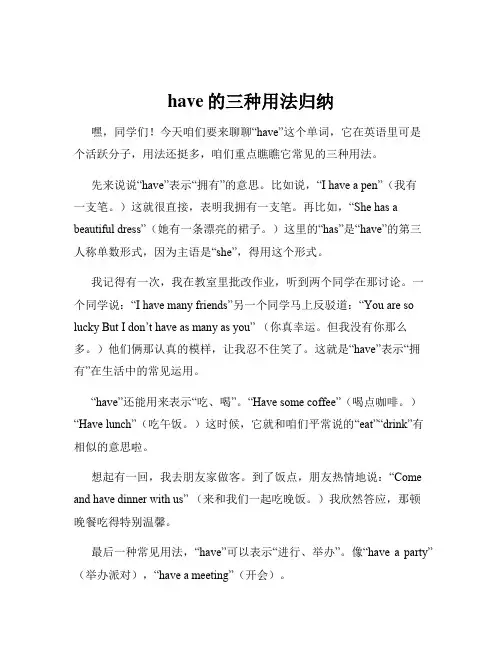
have的三种用法归纳嘿,同学们!今天咱们要来聊聊“have”这个单词,它在英语里可是个活跃分子,用法还挺多,咱们重点瞧瞧它常见的三种用法。
先来说说“have”表示“拥有”的意思。
比如说,“I have a pen”(我有一支笔。
)这就很直接,表明我拥有一支笔。
再比如,“She has a beautiful dress”(她有一条漂亮的裙子。
)这里的“has”是“have”的第三人称单数形式,因为主语是“she”,得用这个形式。
我记得有一次,我在教室里批改作业,听到两个同学在那讨论。
一个同学说:“I have many friends”另一个同学马上反驳道:“You are so lucky But I don’t have as many as you” (你真幸运。
但我没有你那么多。
)他们俩那认真的模样,让我忍不住笑了。
这就是“have”表示“拥有”在生活中的常见运用。
“have”还能用来表示“吃、喝”。
“Have some coffee”(喝点咖啡。
)“Have lunch”(吃午饭。
)这时候,它就和咱们平常说的“eat”“drink”有相似的意思啦。
想起有一回,我去朋友家做客。
到了饭点,朋友热情地说:“Come and have dinner with us” (来和我们一起吃晚饭。
)我欣然答应,那顿晚餐吃得特别温馨。
最后一种常见用法,“have”可以表示“进行、举办”。
像“have a party”(举办派对),“have a meeting”(开会)。
就说前段时间,我们学校组织活动,老师说:“We are going to have a sports meeting next week”(我们下周要开运动会。
)同学们一听,都兴奋得不行,纷纷开始准备。
同学们,“have”的这三种用法可得记牢啦,在日常的英语交流和写作中经常会用到。
多练习,多运用,相信你们能把“have”用得溜溜的!加油哦!。
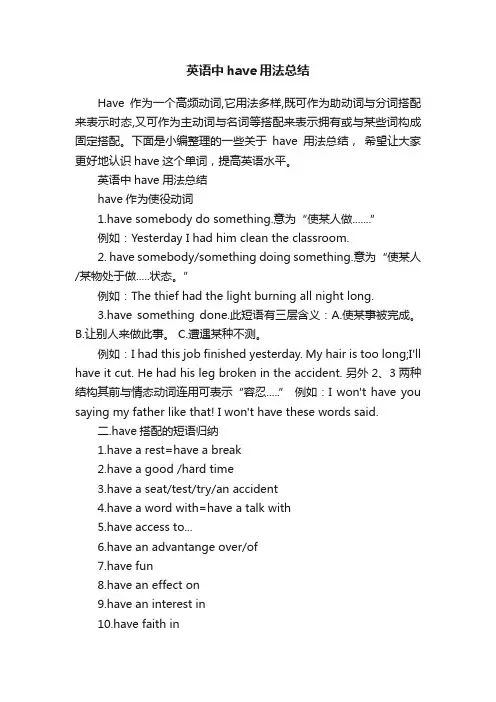
英语中have用法总结Have作为一个高频动词,它用法多样,既可作为助动词与分词搭配来表示时态,又可作为主动词与名词等搭配来表示拥有或与某些词构成固定搭配。
下面是小编整理的一些关于have用法总结,希望让大家更好地认识have这个单词,提高英语水平。
英语中have用法总结have作为使役动词1.have somebody do something.意为“使某人做.......”例如:Yesterday I had him clean the classroom.2. have somebody/something doing something.意为“使某人/某物处于做.....状态。
”例如:The thief had the light burning all night long.3.have something done.此短语有三层含义:A.使某事被完成。
B.让别人来做此事。
C.遭遇某种不测。
例如:I had this job finished yesterday. My hair is too long;I'll have it cut. He had his leg broken in the accident. 另外2、3两种结构其前与情态动词连用可表示“容忍.....” 例如:I won't have you saying my father like that! I won't have these words said.二.have搭配的短语归纳1.have a rest=have a break2.have a good /hard time3.have a seat/test/try/an accident4.have a word with=have a talk with5.have access to...6.have an advantange over/of7.have fun8.have an effect on9.have an interest in10.have faith in11.have a taste for12.have an ear/eye/attraction for14.have no idea of15.have nothing 0.have a relation to16.have nothing/ something/a lot to do with17. have respect for18. have the right to do something19.have skill in20.have.....in common三.have常考句型1.have a good/hard time ( in) doing something Having been ill in bed for nearly a month,he had a hard time passing the exam.(04福建 )2.have trouble /diffculty in doing something I have no trouble in finding his house.3.have no choice but to do something I have no choice but to stay here.4.have got=have I have got a pen=I have a pen.5.have been to...(曾经到过某地) have gone to...(已经到....去了)I have been to Beijing.6. have a better understanding of...(精通.....) He has a better understanding of English.。
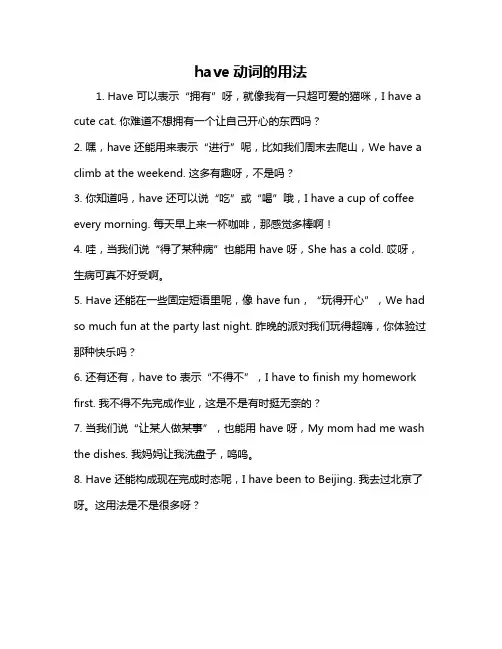
have动词的用法
1. Have 可以表示“拥有”呀,就像我有一只超可爱的猫咪,I have a cute cat. 你难道不想拥有一个让自己开心的东西吗?
2. 嘿,have 还能用来表示“进行”呢,比如我们周末去爬山,We have a climb at the weekend. 这多有趣呀,不是吗?
3. 你知道吗,have 还可以说“吃”或“喝”哦,I have a cup of coffee every morning. 每天早上来一杯咖啡,那感觉多棒啊!
4. 哇,当我们说“得了某种病”也能用 have 呀,She has a cold. 哎呀,生病可真不好受啊。
5. Have 还能在一些固定短语里呢,像 have fun,“玩得开心”,We had so much fun at the party last night. 昨晚的派对我们玩得超嗨,你体验过那种快乐吗?
6. 还有还有,have to 表示“不得不”,I have to finish my homework first. 我不得不先完成作业,这是不是有时挺无奈的?
7. 当我们说“让某人做某事”,也能用 have 呀,My mom had me wash the dishes. 我妈妈让我洗盘子,呜呜。
8. Have 还能构成现在完成时态呢,I have been to Beijing. 我去过北京了呀。
这用法是不是很多呀?
我的观点结论就是:have 动词的用法真是丰富多样又实用啊,大家可要好好掌握哦!。
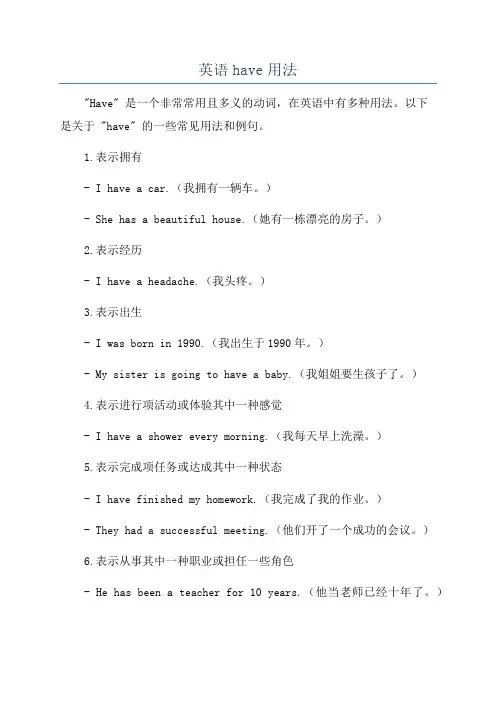
英语have用法"Have" 是一个非常常用且多义的动词,在英语中有多种用法。
以下是关于 "have" 的一些常见用法和例句。
1.表示拥有- I have a car.(我拥有一辆车。
)- She has a beautiful house.(她有一栋漂亮的房子。
)2.表示经历- I have a headache.(我头疼。
)3.表示出生- I was born in 1990.(我出生于1990年。
)- My sister is going to have a baby.(我姐姐要生孩子了。
)4.表示进行项活动或体验其中一种感觉- I have a shower every morning.(我每天早上洗澡。
)5.表示完成项任务或达成其中一种状态- I have finished my homework.(我完成了我的作业。
)- They had a successful meeting.(他们开了一个成功的会议。
)6.表示从事其中一种职业或担任一些角色- He has been a teacher for 10 years.(他当老师已经十年了。
)- She had the lead role in the school play.(她在学校的话剧中扮演主角。
)7.表示发生其中一种情况或经历其中一种事件- We had a power outage last night.(昨晚停电了。
)- She had a car accident on the way to work.(她上班的路上出了车祸。
)8.表示遭受其中一种伤害或强加给人其中一种经历- He had his wallet stolen on the bus.(他在公交车上被偷了钱包。
)- They had their house broken into while they were on vacation.(他们度假的时候,他们的房子被人闯进了。
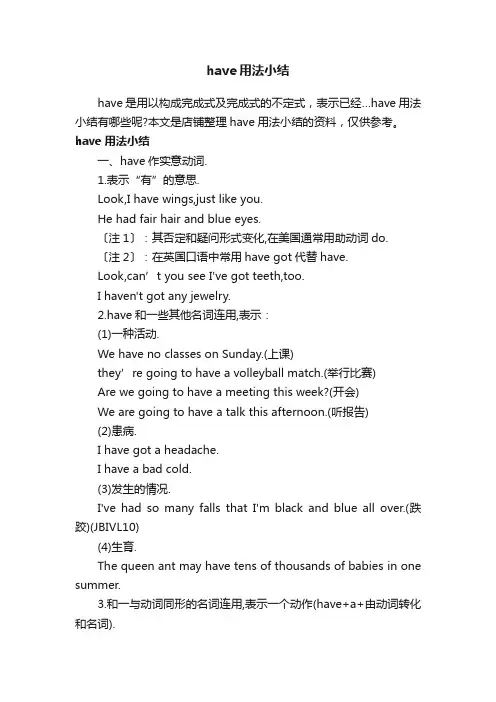
have用法小结have是用以构成完成式及完成式的不定式,表示已经…have用法小结有哪些呢?本文是店铺整理have用法小结的资料,仅供参考。
have用法小结一、have作实意动词.1.表示“有”的意思.Look,I have wings,just like you.He had fair hair and blue eyes.〔注1〕:其否定和疑问形式变化,在美国通常用助动词do.〔注2〕:在英国口语中常用have got代替have.Look,can’t you see I've got teeth,too.I haven't got any jewelry.2.have和一些其他名词连用,表示:(1)一种活动.We have no classes on Sunday.(上课)they’re going to have a volleyball match.(举行比赛)Are we going to have a meeting this week?(开会)We are going to have a talk this afternoon.(听报告)(2)患病.I have got a headache.I have a bad cold.(3)发生的情况.I've had so many falls that I'm black and blue all over.(跌跤)(JBⅣL10)(4)生育.The queen ant may have tens of thousands of babies in one summer.3.和一与动词同形的名词连用,表示一个动作(have+a+由动词转化和名词).Are you going to have a swim.I have a long talk with the teacher.4.have on sth.或have sth.on,表示“穿着”、“戴着”(=to be wearing).I noticed he had on bedroom slippers.At the ball Motile had a diamond necklace on.5.表示“吃”、“喝”.I wanted to have a cup of tea and some eggs.Does she have lunch at home?6.组成复合结构即“have+宾语+宾语补足语”.(1)不加to的动词不定式作宾语补足语(have sb.do sth.),表示让、叫某人做某事.The soldier had him stand with his back to his father.〔注〕:否定结构表示“不能让…”或“从未有人…”.We won't have you blame it on others.She had never had anybody speak to her that way before.(2)现在分词作宾语补足语(have sb.(sth.)doing),表示让(使)某人做某事.…the two men had their lights burning all night long….(3)过去分词作宾语补足语(have sb.(sth.)done),表示:①使(让,请)别人作某事,表示的动作是别人做的.Emperor Qin Shi Huang had all the walls joined up.…he should have new clothes made of this splendid cloth for the coming great procession.②遭遇到某事.Houses near airports sometimes have their windows broken.Workers in some industries have their hearing harmed by the noise of the machine.二、have与to一起构成情态动词,表示“不得不”、“必须”,可用于各种时态.I have to look after her at home.三、have做助动词与动词的过去分词一起构成现在完成时和过去完成时.Great changes have taken place the last two years.They said that the Arab had stolen their camel.四、have用于“情态动词+have+过去分词”的结构,有推测、假设之意.1.must+have+过去分词,表示对过去时间发生的动作或存在的情况的推测,一般用于肯定句.Her father thought that she must have met a fairy.You must have left your bag in the theatre.2.can(could)+have+过去分词,表示对过去发生事情的“不肯定”,常用于否定句和疑问句.He can't have been to your home,he doesn't know your address.3.should+have+过去分词,表示“某事本该早做而实际未做”,用于肯定句.You should have been here five minutes ago.五、have用于某些成语,表示固定的意思.1.have a word(a few words)with sb.,表示和某人说一(几)句话.Where's Peter?I want to have a word with him.2.had better+不带to的动词不定式,表示“…最好…”.I'd better go and look for him now.3.have nothing(something)to do with,表示“和…无(有)”关系.Most of questions had nothing to do with Edison's lessons. 动词have的用法动词have在中学英语中的用法一、have作实意动词。
英语 have 用法Have是一个通用的动词,可以用来表达各种意思。
它可以作为主动词或助动词。
作为主动词,have表示“拥有”、“持有”、“体验”等意思。
作为助动词,have可以用来构成完成时态、进行时态、被动语态等。
下面我们将详细介绍have在不同情境下的用法。
1.表示“拥有”、“持有”Have经常用来表达一个人或一件物品拥有或持有某物的情况。
例如:She has a beautiful voice. 她声音甜美。
I have a headache. 我头疼。
2.表示“体验”有时候,have可以用来表达某种体验或经验。
例如:I have a good memory of that day. 那天的美好经历一直留在我记忆中。
3.表示完成时态。
作为助动词,have经常用来构成完成时态。
完成时态表示过去某个时间点之前已经完成的动作。
例如:I have finished my homework. 我已经完成了我的作业。
4.表示进行时态。
have还可以用来构成进行时态,表示目前正在进行的动作。
例如:I am having lunch right now. 我现在正在吃午餐。
5.表示被动语态。
have还可以用来构成被动语态。
被动语态可以用来强调动作的承受者。
例如:The cake was had by John. 蛋糕被John吃了。
6. have to表示“必须”have to表示“必须”,相当于must。
例如:I have to go to work. 我必须去上班。
7. have got。
have got是have的一种常见的口语形式,通常表示和have相同的意思。
例如:I have got a new car. 我有一辆新车。
总之,have是一个非常强大的动词,有着多种不同的用法。
掌握这些用法可以帮助我们更好地理解和使用英语。
使役动词have的用法总结一、介绍使役动词是用于表达让某人或某物去做某事的动词。
而其中一个常见的使役动词就是have。
本文将详细总结have作为使役动词时的用法,以帮助读者更好地掌握这一重要语法点。
二、作为使役动词的基本用法1. have + 宾语 + 原形动词这种结构表示主语让别人去做某事。
例如:- She had her son clean the room.(她让儿子打扫了房间。
)- They had the workers repair the roof.(他们让工人修理屋顶。
)2. have + 宾语 + 动名词这种结构表示主语让别人去做正在进行的事情。
例如:- He has his secretary writing the report.(他让秘书写报告。
)- We had the children swimming in the pool.(我们让孩子们在泳池里游泳。
)3. have + 宾语 + 过去分词这种结构表示主语安排或委派别人完成某项任务,并侧重于强调行为已经完成。
例如:- The teacher had her students finish the assignment before leaving.(老师在离开前安排学生们完成了任务。
)- They had the car repaired at the mechanic's shop.(他们让汽车在修车厂修理了。
)三、其他常见用法1. have + 宾语 + to-infinitive在这种结构中,have表示“让某人必须去做某事”。
例如:- She had her children to finish their homework before playing.(她要求孩子们玩之前完成作业。
)- The manager had his employees to stay late for a meeting.(经理让员工为了开会而加班。
have吃喝的用法"Have" 用于指 "吃" 或 "喝" 可以有以下几种用法:1. "have" + 食物/饮料:- I have breakfast every morning.(我每天早餐。
)- She had a cup of coffee after lunch.(她午餐后喝了一杯咖啡。
)2. "have" + 食物/饮料 + "for" + 两种以上的用途:- We had pizza for dinner.(我们晚餐吃比萨。
)- He had watermelon for dessert.(他点了西瓜作为甜点。
)3. "have" + 表示食物/饮料的名词单复数形式:- They had some sandwiches for lunch.(他们午餐吃了一些三明治。
)- She has a glass of milk every day.(她每天喝一杯牛奶。
)4. "have" + 可数名词/不可数名词 + "with" + 食物/饮料:- I often have tea with honey.(我经常加点蜂蜜来喝茶。
)- They had hamburgers with fries.(他们吃汉堡的时候还有薯条。
)需要注意的是,"have" 这里并不表示 "吃完" 或 "喝完",而是指 "进食" 或 "喝" 的行为。
如果要表示完成的意思,可以使用其他动词或短语,比如 "eat" 或 "drink up"。
have的例句和用法总结以下是小编为大家整理的have的用法总结,希望能帮助大家更好地认识have这个单词,提高英语水平。
have的意思和用法:aux.用以构成完成式及完成式的不定式,表示已经…;vt.有,具有; 拿,取得; 从事; 必须,不得不;n.〈口〉有产者,有钱人; 富国; 〈英俚〉欺骗,诈骗;have用法小结和例句:一、have作实意动词的用法。
1.表示“有”的意思。
Look, I have wings, just like you.He had fair hair and blue eyes.〔注1〕:其否定和疑问形式变化,在美国通常用助动词do。
〔注2〕:在英国口语中常用have got代替have.Look, can’t you see I've got teeth, too.I haven't got any jewelry.2.have和一些其他名词连用,表示:(1)一种活动。
We have no classes on Sunday.(上课)they’re going to have a volleyball match.(举行比赛)Are we going to have a meeting this week?(开会)We are going to have a talk this afternoon.(听报告)(2发生的情况。
I've had so many falls that I'm black and blue all over.(跌跤)(3)患病。
I have got a headache.I have a bad cold.(4)生育。
The queen ant may have tens of thousands of babies in onesummer.3.和一与动词同形的名词连用,表示一个动作(have+a+由动词转化和名词)。
have作助动词的用法
"have" 作为助动词有以下几种常见的用法:
1. 表示完成时态:在完成时态中,have 作为助动词,后面跟过去分词。
例如:
- She has finished her work.(她已经完成了工作。
)
- I have seen this movie before.(我之前看过这部电影。
)
2. 表示情态动词:have 可以用于表示情态动词,表示别人应该、可能或者不应该做什么。
例如:
- You have to be punctual.(你必须准时。
)
- You shouldn't have done that.(你不应该那样做。
)
- I have to go to the dentist tomorrow.(我明天必须去看牙医。
)
3. 表示另外一件事情的发生:have 可以用于表达某件事情发生在另外一件事情之前或者同时发生。
例如:
- I had just finished my homework when the phone rang.(我刚做完作业,电话铃响了。
)
- She was having breakfast when I arrived.(我到达时她正在吃早餐。
)
需要注意的是,have 作为助动词还有其他的一些用法,这些用法在不同的语境下表达的意思也会有所不同。
have 的用法 have重要搭配与句型 [1]1. have sb do sth (1) 叫(请,使)某人做某事。如: I‟ll have her post the letter. 我要叫她去寄信。 He had his son clean the car. 他叫他的儿子擦车。 (2) 容忍或允许某人做某事(用于否定句,尤与 won‟t, can‟t连用)。如: I won‟t have you tell me what to do. 我不能让你对我做的事指手划脚。 2. have sb (sth) doing sth (1) 使(让)某人(某事物)一直做在做某事。如: He had the light burning all night. 他让灯亮了一整夜。 Within minutes he had the whole audience laughing and clapping. 没出几分钟他就让全体听众笑起来,鼓起掌来。 (2) 容忍或允许某人做某事(用于否定句,尤与 won‟t, can‟t连用)。如: He won‟t have boys arriving late. 他不允许孩子们迟到。 I won‟t have you smoking at your age. 我不能让你在这个年纪就抽烟。 (3) 说服或命令某人做某事。如: He had me doing all kinds of jobs for her. 他叫我为她做各种事情。(from www.etsalon.cn) 3. have sth done (1) 请(让)别人做某事。如: We had the machine repaired. 我们请人修理了机器。 Why don‟t you have your hair cut? 你为什么不理发? 注:有时指无意志的行为。如: He had his salary raised. 他加薪了。 (2) 经历或遭遇某情况。如: He had his finger cut. 他的手指弄伤了。 I had my watch stolen yesterday. 我的表昨天被人偷去了。 (3) 完成或解决某事。如: He had 1000 yuan saved last year. 他去年存了1000元。 I‟ve had all my mistakes corrected. 我已把所有的错误都改正过来了。 (4) 容忍或允许做某事(用于否定句,尤与 won‟t, can‟t 等连用)。如: We won‟t have anything said against the Party. 我们不允许有人这样攻击党。 4. have sth to do 有某事要做。如: I have a lot of work to do. 我有许多工作要做。 She has plenty of clothes to wear. 她有足够的衣服穿。 5. have on (1) 穿着,戴着。如: He had nothing on except a hat. 他身上一丝不挂,只是戴了顶帽子。 (2) 有安排,有计划,有活动。如: I have nothing on for tonight. 我今晚没什么事。 (3) 戏弄,欺骗。如: You won? You‟re not having me on? 你赢了? 没骗我吧? 一、have作实意动词。 1.表示“有”的意思。 Look, I have wings, just like you. (JBⅤL1) He had fair hair and blue eyes. (JBⅥL2) 〔注1〕:其否定和疑问形式变化,在美国通常用助动词do。 〔注2〕:在英国口语中常用have got代替have. Look, can‟t you see I've got teeth, too,(JBⅤL1) I haven't got any jewelry.(SBⅠL5) 2.have和一些其他名词连用,表示: (1)一种活动。 We have no classes on Sunday.(上课)(JBⅡL11) they‟re going to have a volleyball match.(举行比赛)(JBⅢL11) Are we going to have a meeting this week?(开会)(JBⅢL11) We are going to have a talk this afternoon.(听报告)(JBⅢL11) (2)患病。 I have got a headache.(JBⅣL8) I have a bad cold.(JBⅤL3) (3)发生的情况。 I've had so many falls that I'm black and blue all over.(跌跤)(JBⅣL10) (4)生育。 The queen ant may have tens of thousands of babies in one summer.(SBⅠL14) 3.和一与动词同形的名词连用,表示一个动作(have+a+由动词转化和名词)。 Are you going to have a swim.(JBⅢL1) I have a long talk with the teacher.(JBⅣL10) 4.have on sth.或have sth. on,表示“穿着”、“戴着”(=to be wearing)。 I noticed he had on bedroom slippers.(SBⅡL6) At the ball Motile had a diamond necklace on. 5.表示“吃”、“喝”。 I wanted to have a cup of tea and some eggs.(JBⅢL10) Does she have lunch at home?(JBⅡL11) 6.组成复合结构即“have+宾语+宾语补足语”。 (1)不加to的动词不定式作宾语补足语(have sb. do sth.),表示让、叫某人做某事。 The soldier had him stand with his back to his father.(SBⅠL17) 〔注〕:否定结构表示“不能让…”或“从未有人…”. We won't have you blame it on others. She had never had anybody speak to her that way before. (2)现在分词作宾语补足语(have sb.(sth.)doing),表示让(使)某人做某事。 …the two men had their lights burning all night long…. (3)过去分词作宾语补足语(have sb. (sth.)done),表示: ①使(让,请)别人作某事,表示的动作是别人做的。 Emperor Qin Shi Huang had all the walls joined up.(SBⅠL10) …he should have new clothes made of this splendid cloth for the coming great procession.(SBⅠ L8) ②遭遇到某事。 Houses near airports sometimes have their windows broken.(SBⅠL12) Workers in some industries have their hearing harmed by the noise of the machine.(SBⅠL12) 二、have与to一起构成情态动词,表示“不得不”、“必 须”,可用于各种时态。 I have to look after her at home.(JBⅢL4) 三、have做助动词与动词的过去分词一起构成现在完成时 和过去完成时。 Great changes have taken place the last two years.(JBⅥL3) They said that the Arab had stolen their camel.(JBⅤL4) 四、have用于“情态动词+have+过去分词”的结构,有 推测、假设之意。 1.must+have+过去分词,表示对过去时间发生的动作或存在的情况的推测,一般用于肯定句。 Her father thought that she must have met a fairy.(SBⅠL10) You must have left your bag in the theatre. 2.can(could)+have+过去分词,表示对过去发生事情的“不肯定”,常用于否定句和疑问句。 He can't have been to your home, he doesn't know your address. 3.should+have+过去分词,表示“某事本该早做而实际未做”,用于肯定句。 You should have been here five minutes ago.(SBⅡL10) 五、have用于某些成语,表示固定的意思。 1.have a word(a few words)with sb.,表示和某人说一(几)句话。 Where's Peter? I want to have a word with him.(SBⅢL13) 2.had better+不带to的动词不定式,表示“…最好…”。 I'd better go and look for him now.(JBⅢL2) 3.have nothing(something)to do with,表示“和…无(有)”关系。 Most of questions had nothing to do with Edison's lessons.
动词have是中学英语课本中出现频率较高的一个普通单词。它既可以作及物动词,也可以用作助动词,其基本意义是“有、拿、受、取、吃、喝、让……”。大多数同学对have表示某人或某物拥有某物的用法比较熟悉。例如: I have a new pencil-box. He has two coats. A desk has four lezs. 但对have的使役用法却知之甚少,或者说对这种用法掌握得还不太好。下面就让我们通过例句来阐明动词have的使役用法。请看下面的例句: